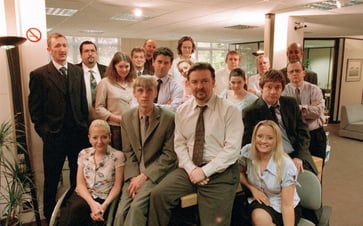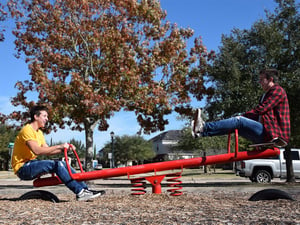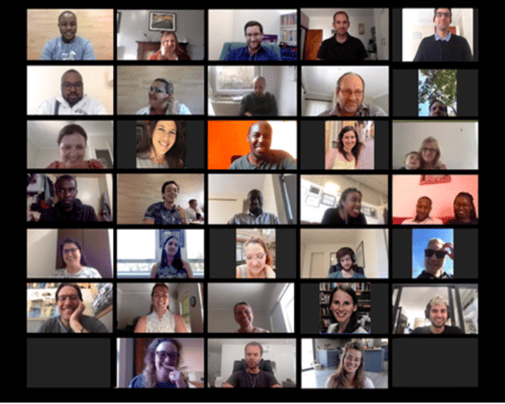"What is between us is nothing more than an illusion.”
Fermina Daza Urbino, Love in the Time of Cholera
In the time of Coronavirus we’re all going to be working remotely. For many, this has been thrust upon them with almost zero time to prepare - practically or psychologically.
TL;DR (too long; didn’t read):
Libryo has been fully remote and remote-first (see definitions below) since its founding in 2016.
- We’ve learned a lot
- On review, the easier stuff is around the practicalities (tools available to use and how to practically manage things). There is a lot of good information about this on the internet already
- The more challenging stuff is ultimately cultural, psychological and systemic
- I have explored these challenges under the following headings:
-
Remote is lonely
-
Remote tests trust
-
Remote is default-dehumanising
-
Remote accentuates different kinds of organisational dysfunction
-
Remote requires more (two-way) empathy and flexibility
-
Remote defaults to working too hard
-
Bonus :) Remote is better
- In the time of Coronavirus, each of the these challenges require special attention
- In the end, we have learned that the pros far outweigh the cons, and the cons can be met if well managed
Please comment after reading - we’re keen to hear your views, questions and suggestions about what else could be added to make this more helpful to others.
SH;DR (super helpful; did read):
Many great pieces have been written about the practicalities of going remote quickly (I like "Remote Working when you’re not a Remote Team” by Kiana Sharifi of Balderton Capital) and how to manage a remote team (I like “Managing remote Teams - a Crash Course” by Andreas Klinger of AngelList), but there’s plenty of other great stuff out there.
So as not to cover this well-worn ground once again, this piece covers a less well-covered topic, namely: the major cultural challenges that come with remote work and fully distributed teams.
Libryo Limited (UK) was founded as a remote-first business. Remote-first means that all work infrastructure enables remote working. For example, meetings are arranged in a video chat room that everyone joins, even though they may be in the same physical space. Even if you have an office space, no one has a permanent desk. Libryo has been fully distributed with about 35 people in 6 countries across many time zones since Libryo’s founding in 2016, with a small remote-first office set up in Cape Town, South Africa.
Challenge 1: Remote is lonely
Man, do I miss those water cooler chats! Or being able to crack a joke in a meeting and actually hear everyone laugh (or not laugh as the case might be), ‘cos they’re not muted (as per strict and sensible online meeting protocol).
I hate having to schedule a meeting every time I have an idea or just want to “jam” something with someone else. I hate not being able to just “grab a colleague” to go for a walk or a coffee or a lunch or beers after work.
Pros and cons, huh.

Remote working comes with many personal and corporate pros, but the biggest felt personal con has to be that nagging feeling of detachment. Like a kid who didn’t get picked for the team - everyone else looks like they’re having so much worky-teamy-fun-times, while you’re sitting in the stands, taking copious team strategy notes in a desperate attempt to be part of it somehow.
This feeling of being left out sinks in slowly but can be persistent, powerful and pervasive.
In teams, and in an organisation as a whole, the sum of the parts can culminate into low morale, interpersonal distrust and ultimately lower team spirit. This can cause a lack of productivity or misdirected work done by individuals and teams.
Overcoming the challenge
With remote teams, there are many effective things that can be done to counter personal loneliness, but they all require forethought and centralised organisation.
Thus, countering personal and team loneliness has to be a key and deliberate management function within teams and organisations - in a way that it just isn’t in a physical/collocated setup, where social stuff often happens spontaneously and in spite of what’s organised.
A few of my favourite practical things that we’ve done at Libryo to foster team spirit and counter personal loneliness:
-
Weekly “all hands” company “standup meeting” on video call - each person speaks for >1 minute on a “highlight”
-
Weekly virtual lunches in teams
-
Virtual coworking: log in to a video call and just work together - make the odd comment every now and then (like coworking in an office)
-
Virtual beers with colleagues (we actually take our laptops to the local pub! Of course this won’t be possible during the time of Coronavirus…)
In the time of Coronavirus: People in quarantine, social distancing and self or family isolation will be extra lonely and feeling cabin fever more than ever. Active consideration to this dynamic will be time well spent by leaders in organisations.
Challenge 2: Remote tests trust
Senior Management at Wernham Hogg paper merchants: “How do you know your team is working productively, David?”
David Brent: “The primary way is that I can see them, right there, working away, like little army ants. They arrive early, they leave late, and they hardly ever take leave. I also have some great reports and stuff that I can show you.”
Senior Management: “Great answer. Glad I can see you too. Good that you also come in on the weekend sometimes. I can tell that you do a lot of important stuff for us.”

Is “time seen at a physical desk” really a good indicator of productivity? Is it actually any indicator at all? We all know it isn’t, yet we still trust in it a lot for some reason, don’t we?
So going remote tests trust between the team members and the team leaders. “How do I know Tim isn’t slacking off?” “Why does Dawn never put her screen on during calls, what is she up to?” “Why does Gareth take so long to reply to my chat messages - what does he do all day?!!”
In a physical context, when people in organisations have these kinds of trust issues, one thing they can tend to do is double-down on surveillance. “Walk the floor” more often or even use other technology-enabled means like cameras and keyboard stroke records. But again, does this even work? Isn’t the “need” for this actually a sign of a bigger issue?
Overcoming the challenge
First, I’d ask: “why do I distrust these people so much?” “Is it them or is it maybe me?” Perhaps you hired the wrong person? In my opinion, the two top attributes of any candidate, for any job, are (1) takes personal responsibility and (2) is proactive. If the person does not possess those qualities, you are always going to have a hard time managing them - remotely or not.
Or is it maybe the system of measurement itself that’s at fault?
We believe organisational problems are usually primarily system problems. The answer for successful remote working is “management by objectives”.
With remote teams, the focus has to shift towards iterative objective cycles, where:
(1) Objectives are agreed
(2) Objectives are met (or not)
(3) Retrospectives about why (especially if objectives are not met) are held
(4) Learn lessons and repeat
We do these iterations weekly (teams, including co-founders), quarterly (management) and annually (with monthly reporting).
Weekly iterations with team members support remote working the most. A discussion on Monday or Friday about last week that was, why objectives were met or not, and what the objectives are for the next week.
At Libryo we have a foundational principle “We are Adults”. We believe that, when all is said and done, people who work for distributed teams need to be trustworthy and thus should also be trusted.
That said, perhaps this just highlights what has always been true for any organisation, distributed or not?
In the time of Coronavirus: It’s time to trust each other. Accept that everyone will be doing the best that they can under very difficult circumstances.
Challenge 3: Remote is default-dehumanising
When I studied psychology at university, I recall a *study that essentially showed that people, while driving cars, behave the way they would in person, but with less inhibition. So, as the data showed, people who cut off others in traffic, or didn’t leave gaps for others, or drove with high levels of aggression and so on - those people were prone to be like that in person, their “true self” was exaggerated behind the windscreen.
*I couldn’t find a reference to the study, but it's a good illustration anyway.
Windscreens and computer screens somehow desensitise us, making us less considerate of others. In some ways, we perhaps subconsciously start to see other people as machines - a means to an end: input/output. We tend to become more transactional. We cram online meetings one after the next - because we can (no need to walk anywhere, right?!) - and we may become quite agitated with any time wasted with social niceties (like “chit chat”) on meetings. There is also no before or after meeting conversation like naturally happens in the physical world - the classic “walk to the elevator” insight, where you often get the kernel of essential truth.
 Overcoming the challenge
Overcoming the challenge
There is a balance here. At Libryo I may have been known to say “no kiff (South African slang for nice but frivolous) chats!”, but we also have a Foundational Principle about making sure that each person has a sufficient margin in their work and personal plans to ensure their continued, sustainable working. No missed flights! No stress related illness!
Part of this margin is making space for social niceties and genuine interpersonal interest. Remember to ask other people “how are you doing” and refuse to accept “fine” as a satisfactory answer. Spend a reasonable amount of time there. But then, for goodness sake, get on with it!
Schedule at least 15 minutes between meetings. Take notes. Make sure people know when the next meeting or deliverable is, and what they need to do before then. We use shared online documents to record meeting notes (Google Docs) and use live comments to assign responsibilities and action items to people.
We try to keep routine meetings congenial and light - more like a “catch up” or a “check in” than a formal and serious weekly occasion.
In the time of Coronavirus: People will be dealing with so much uncertainty outside of work. A certain work routine and clear weekly objectives will go a long way in creating some sense of stability for people. It’s a time to be as human in your interactions with others as possible. Take a genuine interest in the well being of others. Then get stuff done.
Challenge 4: Remote accentuates different kinds of organisational dysfunction
In all organisations, the danger is that those who shout loudest get heard.
With remote teams, the added danger is that only those on the group chats and video calls get heard. The quieter (often smartest) voices are not prone to schedule a call in order to mention a nagging concern or brilliant idea they might have. They have to be invited and drawn out.

Also, when someone is sad or depressed or in trouble at home, it’s far easier for them to go unnoticed - or to hide or pretend.
Interpersonal problems can easily fester. People can misunderstand others and have no occasion or opportunity to reach a better understanding.
Overcoming the challenge
The key is to flatten the lines of communication, enable and encourage frequent interaction (using technology) and create a culture where regular communication is encouraged and
celebrated - including some healthy banter.
Also (and it’s really almost stupidly simple) make sure you work with nice people. That means you too! One of Libryo’s foundational principles is “They must be a “dude” (used as a gender-neutral term)”. Be the best version of yourself and encourage your coworkers to do the same. “Love covers a multitude of sins.” Being a smart person doesn’t forgive being a disagreeable person - it’s just not a smart trade if you want a healthy team dynamic.
Don’t compromise on this.
In high-performance cultures, we find it easy to constructively criticise. We should! But we’ve found that we have to create a deliberate culture of honour. We encourage people to spend time telling their teammates about what they admire about them, what they are good at and why they are valued. Constructive criticism lands far better in a culture of honour. Remote working accentuates the need for this.
In the time of Coronavirus: People will be feeling low for many reasons not related to work. Constructive criticism is always good, but this is the time to maximise your culture of honour and encourage people in the things that they are uniquely the best at. Let's make sure our working relationships are highly functional. Make an extra effort to hear every person’s perspective.
Challenge 5: Remote requires more (two-way) empathy and flexibility
When you’re working from home “life happens” a lot more, because it can! Your kids might walk into the room while you’re doing that once in a lifetime TV interview - or maybe some less dramatic version of that.
Managing by objectives and trusting people has a further dimension and benefit: as long as objectives get met, it doesn’t really matter when (or where) the work is done. “Do it 2am, do it from a tropical island - just get it done.”
Life’s going to happen at home. Interruptions, changed plans, just life stuff...
Overcoming the challenge
So plan in advance. Create boundaries at home. And communicate. If life happens and you are unable to make a meeting last minute, say so.
At your organisation, create the space (cultural acceptance) for people to flex with the challenges of life at home. Trust people with this responsibility. This means not guilting people when life happens. If they are adults, then they will exceed your expectations in terms of acting responsibly. If they aren’t able to behave like adults, well…
This corporate empathy, however, requires a balanced and thus commensurate empathy from the individual to the corporate in turn. This usually comes in the form of how the individual uses their discretionary energy. Sometimes it's a few more hours here or there, when the objectives just have to be met for the business plan to stay on track. Sometimes, to counter loneliness and build team spirit, it's just a kind word to a co

lleague or some sort of practical help offered in a time of need, or volunteering to fill a gap that the organisation has no one to fill.
Through our experience, this give and take relationship is highly rewarding, both personally and collectively. People receive freely and give freely in return.
But sometimes people give too much…
In the time of Coronavirus: People will need to deal with a lot more life at home. Kids bored to tears, the ongoing scramble for needed supplies, sick relatives or friends and volunteer community support initiatives (which companies should actively encourage their employees to participate in). On the other hand, many organisations will be in survival or crisis management mode and there will be a lot of value in employees using their discretionary energy to move things at the margin. Being flexible will be more important than ever.
Challenge 6: Remote defaults to working too hard
People working from home quickly find that they live at their desks. It’s no longer just the email on the phone, or the work chat app, it is the actual place where they “do their day job” - this is now in their house.
As Garth (co-founder) commented, “I've also found that there is not a coffee shop in Oxford that is just a coffee shop for recreation. They are all my office!”
This makes it far too easy to blur the lines between one’s personal space and work space, as well as time to a completely indistinguishable fog.
With work being so flexible during the day, when does the day end? What if a bit of life happened and I was distracted for an hour?
Given the choice to (a) spend time with the kids (wow, they’ve been watching lots of TV!), (b) exercise or (c) get to inbox-zero: what should I do? Even though it’s 5:45pm - I kinda wasn’t working all day. Wow, that inbox draws hard on my attention!
Now that you’re commuting 2 hours less a day, now that you’re not spending 45 minutes a day shooting the breeze with colleagues, or an hour and a half lunching - why aren’t you working 2 hours less a day?
In today’s world, today’s work is never done. The to-do list shrinks from the top and grows from the bottom - like a living river of requirements. Saying “it is finished” and “it is good” is more a discipline of faith than a statement of objective truth.
 Overcoming the challenge
Overcoming the challenge
At Libryo we constantly encourage ourselves and others to stop. Take a break. Do it on Monday. We have a foundational principle (also the entity name of our original holding company): “Sustainenable”. If you’re not working individually and corporately, in a sustainable way - what then are you enabling?
Grant Gunston (one of the cofounders of Sustainenable (Pty) Ltd) often says “We overestimate what we can do in a day, but underestimate what we can do in a year.” It’s important to remember that, and to be satisfied at the end of each day.
Life may be short, but your life’s work has to be seen as a marathon, not a sprint.
In the time of Coronavirus: People will want to do as much as they can to help their organisations to weather the storm. Make sure that you, individually and corporately, are able to accept that enough is enough and tomorrow is another day. Run the marathon.
7. Bonus :) Remote is better
Remote is better for families. It is better for the planet. It is better for the individual. It is better for the collective.
For all of the cons, the pros far outweigh. The cons can be managed if done so thoughtfully and deliberately. Most of the “problems” created for organisations by remote working, were always problems anyway (you probably just couldn’t see them clearly).

Typical weekly all hands company standup call at Libryo
In closing, some sage practical advice for people working from home, from the World Economic Forum:
-
Wake up at your normal time and do your normal work routines
-
Plan virtual coffee breaks with colleagues
-
Separate your space to work from your space to relax
-
Take enough breaks
-
Create a good routine with small exercise breaks
-
Keep talking to people so you don’t feel isolated
-
Have a comfortable chair, table and quiet space to be able to do focussed work
-
Dress properly, don’t wear pyjamas!
-
Set specific working hours
-
Use the time you would usually spend on a commute to read in bed
Who knows, perhaps when this episode of Work in the time of Coronavirus is over, we may not ever return to all of our prior collocated work practices?
I, for one, would support that.
----
Libryo is tracking and publishing the latest regulations surrounding COVID-19 in this live blog - so check in for the latest COVID-19 regulatory updates that relate to your operations and countries/states.
